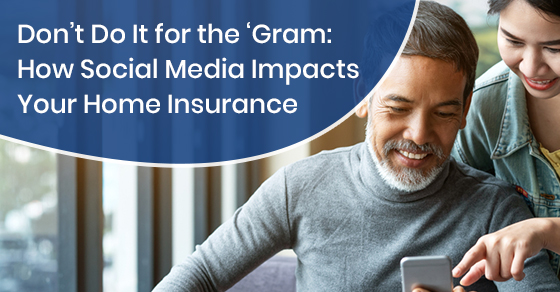
Don’t Do It for the ‘Gram: How Social Media Impacts Your Home Insurance
Are you going on holiday? It might be high time to think twice before posting your vacation pictures online — especially if no one else is going to be home. Whether you’re just going out of town or to a tropical destination that’s three flights away, you can’t be taking chances when it comes to the vulnerability of your property and valuables.
If the risk of property damage and theft isn’t enough to make you think twice before posting a geotagged vacation selfie on the beach, maybe the risk of losing home insurance coverage will.
That’s right — home insurance providers are increasingly rejecting claims from homeowners whose houses were broken into while they were on vacation, simply because they made this vulnerability available on social media.
Can home insurance providers even do that? Unfortunately, the answer is yes. As a homeowner, home insurance is your first line of defence against property damage and loss, especially when you’re away. But that doesn’t mean you should contribute to the risk of that happening.
Home insurance is designed to protect your property and valuables from accidental and unforeseen damage, which requires “reasonable care” or taking every precaution possible to keep your property safe. Posting those vacation ‘grams, though, when you’re on holiday, and no one else is home, can violate reasonable care.
How Vacation Selfies Put Your House at Risk
With GPS and location services very much built into the smartphone ecosystem and online communication, it’s best to rethink your online habits, especially on vacation. Besides, wouldn’t you rather unplug to unwind?
The fact is, with every geotagged vacation ‘gram posted in real-time, you put your property at great risk. Yes, it’s quite tempting to share a “#WishYouWereHere” photo at the beach to family and friends — and show them what they’re missing out on — but doing this in real-time when no one else is home exposes you to the risk of burglaries.
Even with a private account and advanced sharing settings, you still run the risk of exposing home security vulnerabilities to your friends’ networks. The slightest interaction on your vacation posts can appear on other people’s feeds because of mutual friends. It doesn’t help that your average house burglars are becoming more creative these days, and it wouldn’t be a long shot for them to use social media to find their next target.
Protect Your Vacation Posts and Your Home
Let’s face it, holding off on sharing those unreal vacation shots is easier said than done. Sometimes, you just can’t help but share the feeling, even just to the closest of family and friends.
If you absolutely have to share a quick update or post a once-in-a-lifetime Instagram travel post, at least take necessary precautions to protect your life at home and everything you love in it:
1. Check who sees your posts
To start, check your current privacy settings on social media. Make sure that your posts are set to private or viewable only by friends. And while we’re on the subject — not everyone is your friend, so avoid accepting requests from people you do not know or have not met. If you currently have people on your friend list that you don’t know or trust, now would be a good time to remove them and prevent them from accessing your information.
2. Turn off location services
When not in use, turn off location services. Chances are, you’re not navigating to a destination all the time — especially on vacation — so turn off location sharing when it’s not actually in use. This prevents criminals from knowing where you are at any given time — and knowing that your house is left unattended.
3. Check your privacy settings
Check what is actually visible on your profile, especially to the public. Even if your posts are set to private, some of your basic profile information may still be publicly accessible, such as your full name, date of birth, hometown or location, education, and workplace.
Use external search engines, such as Google, to find yourself and see what type of information is possible; just because you didn’t “check-in” on Facebook when you got to your hotel doesn’t mean your Instagram story announcing arrival at a vacation resort would not be visible when your profile shows up. In any case, it’s a good idea to minimize available personal details on your social media profiles.
Reasonable Care in Home Insurance Policies
For home insurance providers, your social media privacy settings can say — and do — a lot about safety in your home, especially when you’re away. While there isn’t a specific clause that denies coverage when you share vacation posts on social media and your house gets broken in often after, the Reasonable Care clause is standard in most policies.
Reasonable care is the standard clause in home insurance policies that require homeowners to take care of their homes to ensure coverage in the event of damage. It works like a guarantee — insurance providers want to ensure that claims for damage are actually substantial and that these arise from real accidents, not just negligence or fraudulent intentions.
Home insurance providers include this type of clause to encourage homeowners to maintain their property and reduce risks for accidents and damage, as these are devastating and costly to repair and compensate, a situation in which everyone loses. After all, the best-case scenario is one where no one gets hurt and there is no damage to property.
In the case of break-ins, theft, and resulting property damage while homeowners are away on vacation, home insurance providers definitely take a look at contributing factors that played a role in facilitating the crime. While owners may not be directly at fault and considered negligent for sharing vacation posts online — even when unwittingly exposing vulnerabilities in their home security — it is still not advisable to contribute to a break-in.
Sharing posts indicating that you’re not home by means of geotagging and making it clear that the rest of the family is with you, or that you’re clearly out of town for an extended period counts as contributing to the likelihood of burglary, and in extreme cases even to the point of violating the Responsible Care clause.
Even more important, however, is limiting what you post about your home; ensuring that you do not in any way allude to where valuables are kept, or posting a mirror selfie with storage compartments for jewelry and other valuables in plain view. It’s just like making sure that the doors and windows are locked and cannot be opened from outside by intruders.
Other Ways to Keep Your House Safe
Whether you’re going on vacation or not, the fact remains: it’s only good sense to take necessary precautions against property crime, instead of simply expecting your home insurance coverage to cover damages that result from plain negligence.
Bear in mind — home insurance is an added protection designed for things outside your control, such as accidents, disasters, and forcible crime that can’t be avoided simply by keeping doors locked and avoiding geo tagging your posts, let alone sharing your exact address on public forums online.
As it’s inevitable that you leave your house unattended at some point, there are concrete but straightforward measures you can take to protect your property. One of these is installing a home security system.
Most modern systems now offer smartphone connectivity, so you can receive intruder alert notifications, set alarms, and check real-time CCTV monitoring even when you’re halfway around the world lying on the beach. Preventative measures like this demonstrate fulfillment of responsible care and have a positive impact on your home insurance rates.
Before you get on the plane or drive off, ask a trusted family member, friend, or long-time neighbour to check on your house once in a while. This can be really helpful especially if you travel a lot or are gone for extended periods, as they can check for signs of damage and forced entry, along with disguising the fact that no one is actually home.
When potential burglars see regular activity like this, it deters them from targeting your house, as it makes them feel that they are constantly at risk of being caught. Just make sure that whoever you trust to house-sit has a direct way of reaching you in case of an emergency.
Don’t leave your valuables unattended. This includes your house, especially in the age of Instagram-worthy vacation posts. At the end of the day, you’ll want to have a house to come home to, in the exact shape that you left it. With the right home insurance coverage and keeping up with Responsible Care, you can have a relaxing, worry-free vacation.
To learn more about keeping your home safe while on vacation, call Oegema Nicholson at 613-224-1455 or contact us here.

